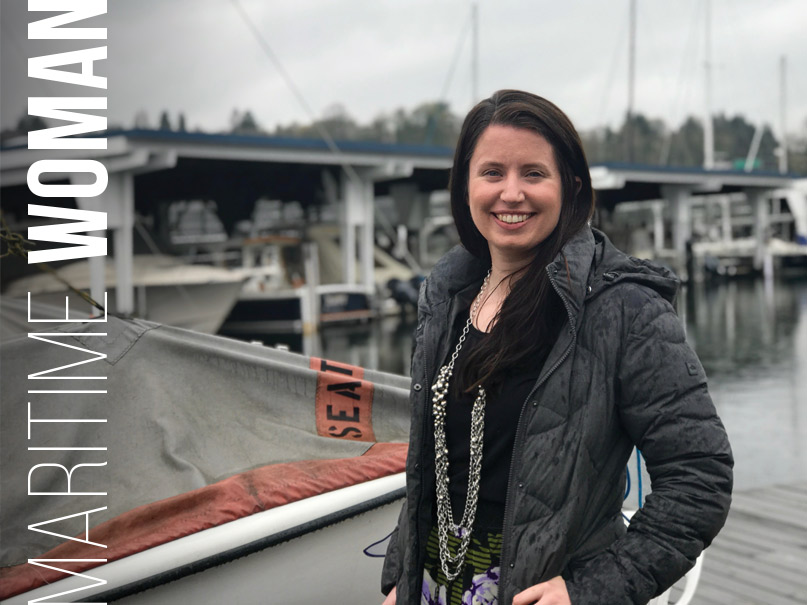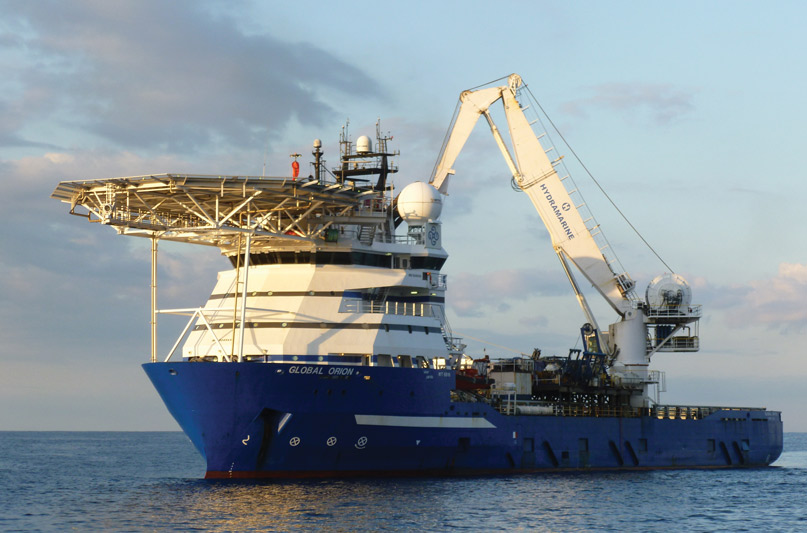
 When she was six, her father taught her how to tack during a Seattle Yacht Club (SYC) event. She was so intent on mastering this essential sailing skill, she stayed out on Portage Bay until the sun set. That day Cedeno discovered a passion for the water that propelled her into a career where few women venture.
When she was six, her father taught her how to tack during a Seattle Yacht Club (SYC) event. She was so intent on mastering this essential sailing skill, she stayed out on Portage Bay until the sun set. That day Cedeno discovered a passion for the water that propelled her into a career where few women venture.
Today, Cedeno is a dynamic positioning operator aboard the Transocean’s Deepwater Poseidon, a 780’, 70,000-gross-ton oil drillship stationed in the Gulf of Mexico. The post requires navigating the enormous vessel within 3′ of a target site to drill wells in the Gulf. To hold the ship stationary, an operator employs software that reduces the vessel motion along the yaw, surge, and sway axes (the three directions the ship moves). Before stepping into the offshore oil industry, Cedeno worked as a merchant mariner on different types of cargo vessels, cruise ships, and a dive support vessel.
At 32 years old, she has circumnavigated the globe, kibitzed with emperor penguins, and dealt with pirates off the coast of Somalia.
It’s been an adventure and a career she wouldn’t trade for the world. She’s worked on half a dozen ships over the past ten years and has spent over 1,000 days at sea. But as a woman in a male-dominated field, it has also been lonely and isolating. Women comprise only 4 percent of the offshore industry workforce, merchant marines are a mere 2 percent female. Cedeno learned early on that there were obstacles being a working woman at sea.

As a cadet, Cedeno was stationed on a cargo carrier delivering military vehicles to the Middle East. While the ship was docked in Kuwait, she was approached by a shipping agent as she was working on deck. The agent told her to return to her quarters because women could not work on a ship in that country. Cedeno said “No way” and rolled up her sleeve, like Rosie the Riveter, in response. Her officer came out to prevent further conflict and told Cedeno to go to another part of the vessel that was not in the public eye.
“I respect that we were in a different culture, but I was on my ship,” she says. Cedeno is a far cry from a tough, tattooed sailor. In person, she has a warm smile and long, black hair that falls to her shoulders. She prefers to be called Ally, rather than the more formal Allison. Her husband, Joe Cedeno, and she share a home in Seattle, her home base, where she commutes back and forth from gigs on the Gulf. They adore their three small rescue dogs, and for relaxation, she takes photos.
In many respects, Cedeno has her dream job on the water. Ever since that day spent tacking back and forth from the SYC’s dock, Cedeno felt most alive on a boat.
“Being on the water is what has given me purpose in life and work,” she says. At the tender age of eight, she joined the SYC’s junior sailing program and sailed her way into national rankings by the time she was in high school. She formed the first sailing team at Roosevelt High School in Seattle, and after graduation, she headed to the U.S. Merchant Marine Academy in Kings Point, New York. She earned the “Female Athlete of The Year” award for her sailing performance at Kings Point during her senior year.
She credits her dad, longtime SYC member Bill Davis, for inspiring her to pursue a life on the seas. “He encouraged me to do everything on a boat. There was no holding back,” she says. In fact, it was her father who introduced her to a woman who graduated from Kings Point and was working as a merchant mariner–the inspiration for Ally’s career choice.
After meeting her, Ally decided she wanted a career sailing the world and finding adventure.
Her first year out of the academy, she worked on National Geographic expedition ships. She spent four months in Antarctica on the M/V NG Endeavor, exploring the Antarctic Peninsula. She encountered the rarely-sighted emperor penguins, personable birds that stand 3′-4′ high and are the largest penguins in the world. Wildlife encounters abounded on that voyage; seals, whales, and albatrosses were everyday occurrences. The ship was often accompanied by humpback whales, and the crew wondered who was looking at who. Next, she hopped aboard the M/V NG Explorer, where she sailed from the Seychelles to Egypt. It was a pivotal journey for the young merchant marine.
Numerous hijackings by pirates occurred during that time along the eastern coast of Africa. Think of the movie Captain Phillips with Tom Hanks. Things were tense at the helm. At one point, the captain was detained in another part of the ship, and Cedeno was in charge when the armed security guard alerted her. There was a suspicious ship ahead and she should alter course, said the security guard. Cedeno looked at the unidentified blip on the radar and saw it was not moving rapidly.
The crew had methods to dodge the pirates: outrun them; aim and blast firehoses at the marauders; and cover the ship with grease, making it impossible to board. Cedeno said, “No, we are staying the course,” after thinking through the situation. The ship was going 16 knots and the wind was with her. It turned out to be the right call. The small potential target was a family fishing, who waved as the large ship sailed past them.

The experience was a turning point for Cedeno. Always one to determine her own course, she liked the idea of navigating an enormous vessel on the water. It was then that she decided to get the training necessary to be a dynamic positioning officer. “I just love being on the water, with sunrises and sunsets. I love navigating the ship through congested waters or open waters. With dynamic positioning, you are always looking for the one thing that could go wrong.”
Last year she started thinking about the future and what she wanted to do with the rest of her life. “It was a dark night of the soul,” she said. “There were times I needed someone to talk to. It’s isolating enough offshore, it’s especially isolating when your gender separates you.” Not one to sail into headwind and stall, Cedeno thought about how she could tack and find her way.
She created a website, womenoffshore.org, that is now a virtual community that reaches out to the women who work at sea amid a male-dominated culture. She started the website with her own funds right as the #MeToo movement exploded in October 2017. Talk about timing.
The website is supported by an all-volunteer staff, and the design was developed by a friend she recruited. Podcasts are a recent addition. Womenoffshore.org addresses topics such as combining work and family, fitness on a ship, and navigating a career path — topics that are deeply personal and yet universal. In one way, it’s almost like a traditional women’s magazine but for women working in a completely untraditional field across the globe. The site has received over a 100,000 hits since inception and become both a vital resource and inspiration for the tribe of women working on the water, including Cedeno.
But it’s not all about the gals. Cedeno considers the opposite sex a vital part of the solution to making the workforce more balanced. Some men just don’t know how to handle working side-by-side with a woman on a ship, she says. It’s the little things that make life aboard awkward, such as men feeling uncomfortable shaking hands, or sitting at the same table in the mess hall, or having a woman officer as a superior. She believes it is necessary to include them in the conversation.
“We cannot be considered victims. We need platonic relationships with men, to bring them into the conversation,” she said. “We need to be seen as whole people, not just a gender. We’re all in this industry together.” It’s a call that currently resonates across many fields.
Cedeno looks to the horizon, plotting her next step. She and her husband are soon moving to Houston, Texas, so she can attend Rice University and attain an MBA. She sees the business degree as a ticket to work up the corporate ladder and kick down doors. She vows that her career will always be on the water.
During her time onshore, she will continue to nurture womenoffshore.org. The organization will host an event, Unite, for women in the maritime industries in Houston July 27-28. The focus, of course, will be overcoming challenges in the male-dominated field.
Sharing stories is key to attracting and keeping women in the industry, Cedeno emphasizes. The stories shared on womenoffshore.org have inspired Cedeno to consider combining work and family. An offshore work schedule is flexible, with the typical rotation being three weeks on, three weeks off. According to Cedeno’s math, you can spend more quality time with children on this schedule than working nine to five.
On land or sea, her goal is to open doors and pave the way for more women to have a life at sea. Whatever direction Cedeno sets sail upon, rest assured she will chart her own course.
“I’ve been captain of my own boat since I was six,” she says with a smile.
Read the full story on Issuu